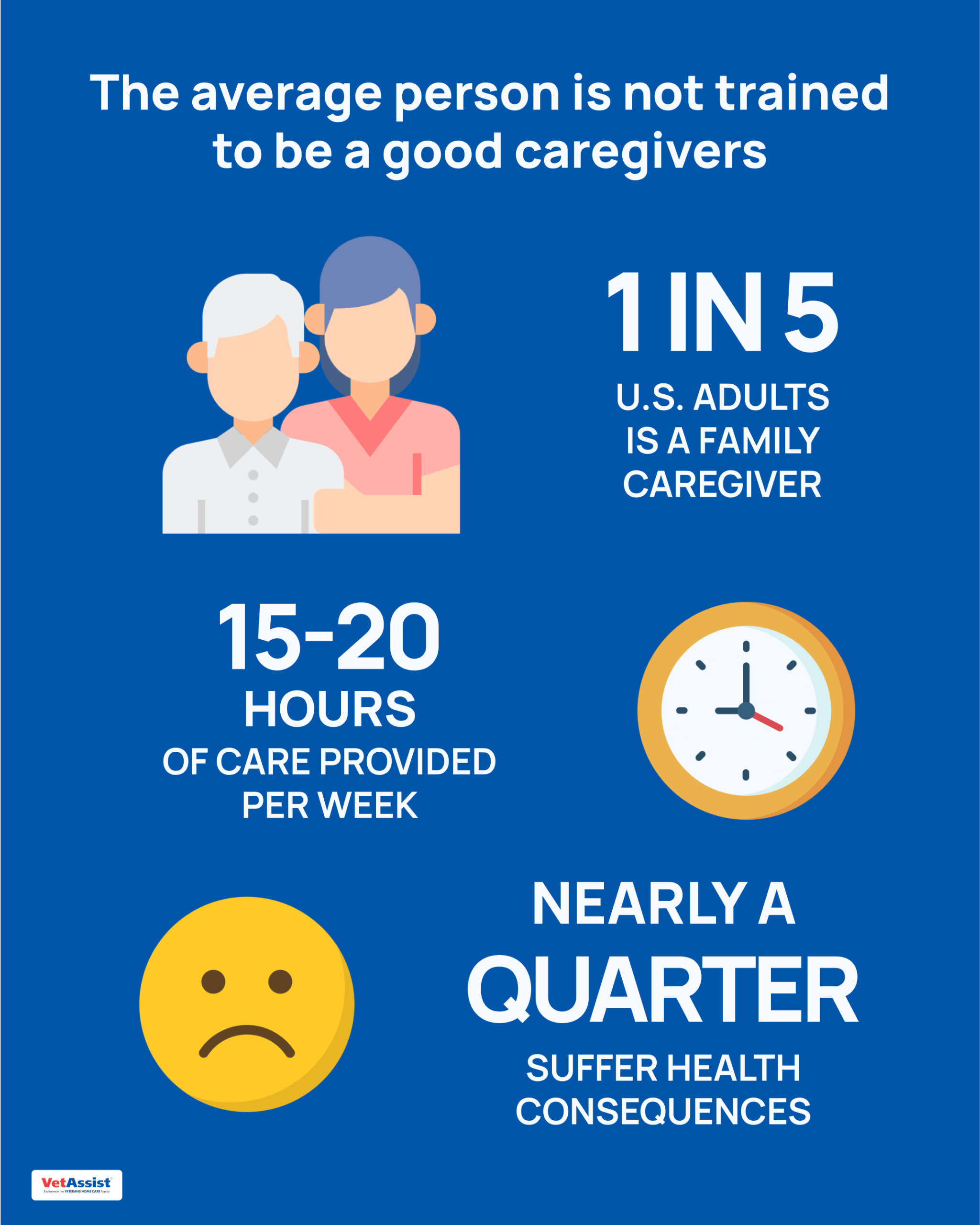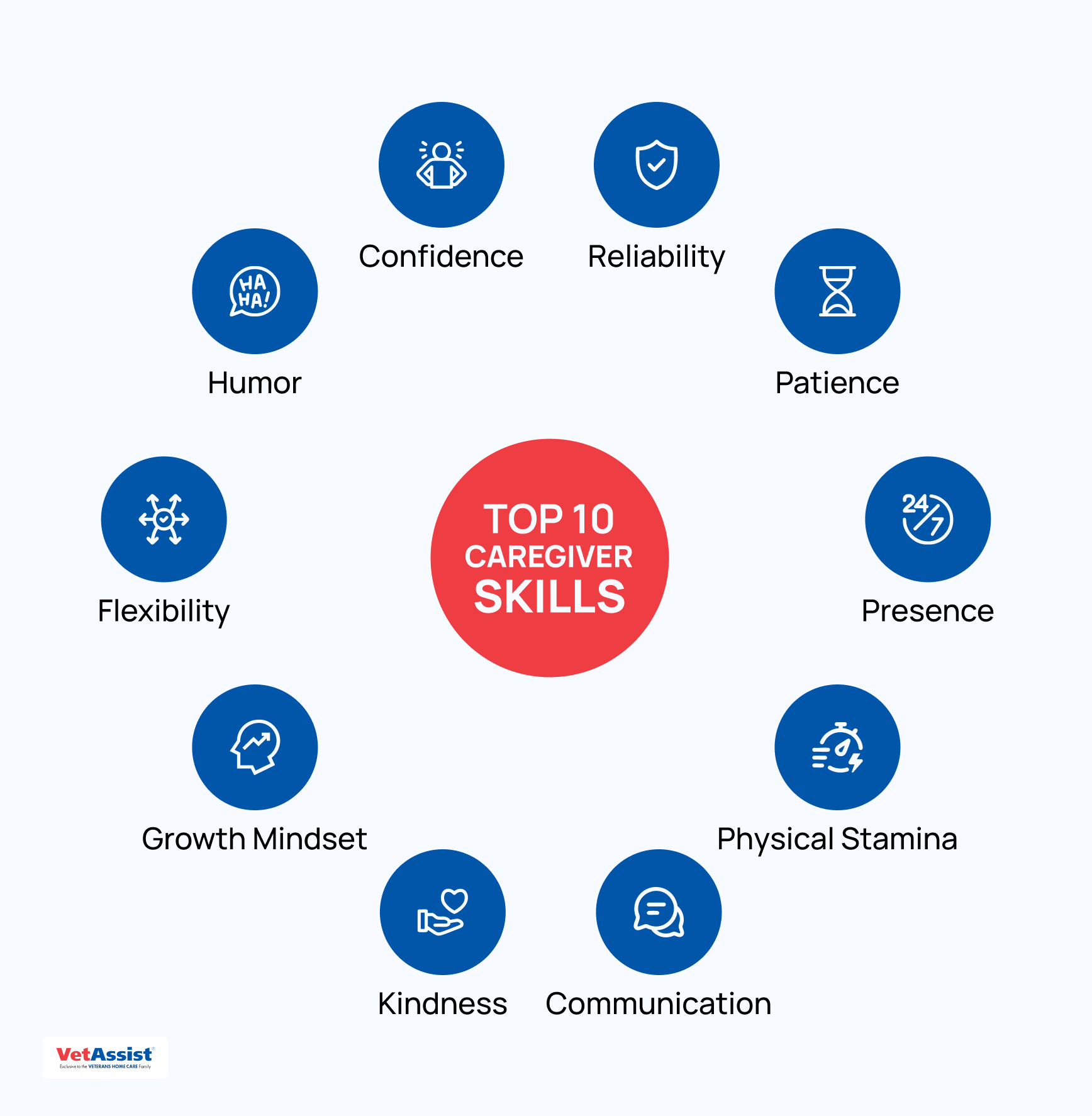Top Caregiver Skills: 10 Qualities and Experience to Prioritize
Caregiving is an increasingly important role in a society whose elderly population is steadily growing. Caregiver skills include a variety of both program-trained experience and character qualities.
 The average person is not trained in how to be a good caregiver, and yet, approximately one in five US adults is caring for a disabled or chronically ill relative, the majority being an elderly parent or spouse. These family caregivers shoulder around 15-20 hours of care labor per week. While most may say that they gladly provide for their loved one’s needs, AARP has found that almost a quarter of family caregivers suffer health consequences from providing care on top of their other responsibilities, or from providing care for which they have not been trained.
The average person is not trained in how to be a good caregiver, and yet, approximately one in five US adults is caring for a disabled or chronically ill relative, the majority being an elderly parent or spouse. These family caregivers shoulder around 15-20 hours of care labor per week. While most may say that they gladly provide for their loved one’s needs, AARP has found that almost a quarter of family caregivers suffer health consequences from providing care on top of their other responsibilities, or from providing care for which they have not been trained.
Family caregivers should explore a wide net of options for support in caring for their loved ones, whether it entails untapped VA benefits, respite care opportunities, or home care services. They might also consider how their own personal strengths align with the qualities of a good caregiver as they care for their loved ones (because you are doing something amazing!).
What follows are 10 qualities of a good caregiver—whether you are seeking a skilled professional that will provide the best care for your loved one, or developing your own abilities to care for others.
Patience
 Patience falls among the most important characteristics of a caregiver because it is so deeply necessary. Elderly, chronically ill, and/or disabled individuals need more time and assistance to complete routine tasks like eating a meal or getting dressed. Those with memory care needs might display confusion, anger, or fear, requiring calm and understanding from their caregiver. A caregiver who is impatient or who cannot manage their own emotions will not be able to provide the support these individuals need and will only contribute to their—and the family’s—stress.
Patience falls among the most important characteristics of a caregiver because it is so deeply necessary. Elderly, chronically ill, and/or disabled individuals need more time and assistance to complete routine tasks like eating a meal or getting dressed. Those with memory care needs might display confusion, anger, or fear, requiring calm and understanding from their caregiver. A caregiver who is impatient or who cannot manage their own emotions will not be able to provide the support these individuals need and will only contribute to their—and the family’s—stress.
Communication Skills
 Communication is an important caregiver strength. The caregiver should be able to explain any complicated processes and give clear reasoning and expectations; this includes matters related to cost and billing. They should consistently listen well and be responsive to calls and messages.
Communication is an important caregiver strength. The caregiver should be able to explain any complicated processes and give clear reasoning and expectations; this includes matters related to cost and billing. They should consistently listen well and be responsive to calls and messages.
Kindness
 Caregivers must be consistently kind. Those needing care are vulnerable and best benefit from a caregiver who is compassionate, helpful, and brings their best, kindest self to their interactions—even when accidents happen or the unplanned occurs.
Caregivers must be consistently kind. Those needing care are vulnerable and best benefit from a caregiver who is compassionate, helpful, and brings their best, kindest self to their interactions—even when accidents happen or the unplanned occurs.
Flexibility
 The unplanned does indeed occur! One of the best strengths as a caregiver is the ability to go with the flow sometimes. Rigidity does not serve a patient or client who is, by nature of their health challenges, going to sometimes buck the plan. Caregivers must be able to problem-solve in the moment, as well as plan ahead.
The unplanned does indeed occur! One of the best strengths as a caregiver is the ability to go with the flow sometimes. Rigidity does not serve a patient or client who is, by nature of their health challenges, going to sometimes buck the plan. Caregivers must be able to problem-solve in the moment, as well as plan ahead.
Reliability
 The client or patient and their family must be able to trust the caregiver. Vital caregiver qualities include punctuality and integrity in doing what they say they will do. Families cannot have peace of mind if their loved one’s caregiver cannot be relied upon.
The client or patient and their family must be able to trust the caregiver. Vital caregiver qualities include punctuality and integrity in doing what they say they will do. Families cannot have peace of mind if their loved one’s caregiver cannot be relied upon.
Presence
 Another quality of a good caregiver is the ability to focus on the present. This allows them to be emotionally in tune with the person for whom they are caring, as well as their family or other caretakers. Presence also means paying attention to detail and avoiding distractions as much as possible; this is especially important when it comes to health routines, notes and documentation, and household tasks where safety is a factor. A good caregiver will not be looking at their phone while someone is talking to them or while completing other tasks.
Another quality of a good caregiver is the ability to focus on the present. This allows them to be emotionally in tune with the person for whom they are caring, as well as their family or other caretakers. Presence also means paying attention to detail and avoiding distractions as much as possible; this is especially important when it comes to health routines, notes and documentation, and household tasks where safety is a factor. A good caregiver will not be looking at their phone while someone is talking to them or while completing other tasks.
Confidence and Boundaries
 Good caregivers provide reassurance to their clients and their families. They do this by communicating that they know what they are doing. While training and experience are the foundation of caregiver confidence, they must also cultivate emotional steadiness and self-control.
Good caregivers provide reassurance to their clients and their families. They do this by communicating that they know what they are doing. While training and experience are the foundation of caregiver confidence, they must also cultivate emotional steadiness and self-control.
Furthermore, they should know how to say “no” to requests that are out of the scope of their care, so as not to disappoint the family or burn themselves out. For family caregivers, this principle also holds: know your limits, and respect them.
Physical Stamina
 Many caregiving tasks involve physically supporting someone with limited mobility, such as with transferring and toileting. It can also involve household chores with a lot of bending, lifting, and standing. Caregiver strength and stamina are a huge, practical benefit here.
Many caregiving tasks involve physically supporting someone with limited mobility, such as with transferring and toileting. It can also involve household chores with a lot of bending, lifting, and standing. Caregiver strength and stamina are a huge, practical benefit here.
Growth Mindset
 Caregiving is a challenging occupation, whether for the professional or the family member. Missteps will happen, and so will bad days. Caregivers must adopt the attitude that they will learn how to do better next time and that tomorrow is a new day. This posture helps build resilience and makes it possible to keep going for the long haul.
Caregiving is a challenging occupation, whether for the professional or the family member. Missteps will happen, and so will bad days. Caregivers must adopt the attitude that they will learn how to do better next time and that tomorrow is a new day. This posture helps build resilience and makes it possible to keep going for the long haul.
Humor
 One of the most helpful caregiver traits is a sense of humor and the ability not to take oneself or others too seriously. Humor also builds resilience and provides hope in situations that can otherwise feel heavy and frightening. Finding the humor in caregiving is a gift to all, including the caregiver.
One of the most helpful caregiver traits is a sense of humor and the ability not to take oneself or others too seriously. Humor also builds resilience and provides hope in situations that can otherwise feel heavy and frightening. Finding the humor in caregiving is a gift to all, including the caregiver.
Caregiving is a selfless gift to your loved one, but if they have come to a point where they need professional home care, our VetAssist mission is to make it easily and quickly accessible for those who qualify through the VA Pension with Aid and Attendance benefit. Veterans Home Care can help you determine whether you or your loved one will be eligible to receive the benefit, which can cover some or all of the cost of home care, and we make it easy to apply. Chat with us via our website, or call us at (888) 314-6075.
















